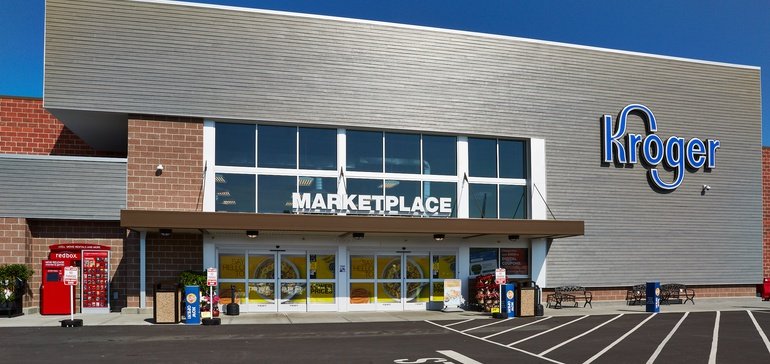Courtesy of Kroger
AUTHOR|Peter Adams
Source: www.mobilemarketer.com, November 2020
A customer shift to mobile and concerns around a contentious election helped push the chain into a market with a surprisingly strong audience match.
When the topic of video games comes up, most people — and many marketers — tend to think of a particular demographic: young men playing consoles like Xbox and PlayStation at home. But a surge in mobile gaming during the pandemic has shown that the category commands an increasingly diverse user base, including women over 18, spurring more non-endemic brands to jump in.
Kroger, the 137-year-old grocery giant, is a standout example: It recently gave its first crack at mobile game advertising with a display campaign that showed promising enough results that the tactic could become a bigger part of the marketer’s playbook as larger disruptions threaten to roil the ad industry, executives indicated. The effort ran across multiple gaming apps, according to a spokesperson, but the brand declined to share which ones.
“As an audience-first advertiser, we were planning for a campaign that was designed around a specific strategic target of ours that skews younger, female, parent,” Kendra Clune, associate media director at Kroger, said during a session at the Mobile Marketing Association’s Smarties Unplugged Virtual event Wednesday. “We had data that said this group of customers really indexes high with mobile gaming.”
The company’s first toe-dip into mobile gaming drove efficient CPMs, higher engagement and higher conversion rates, Clune said, although the executive didn’t share specific figures. But beyond offering the right audience match, the experiment keyed into two areas of growing importance to Kroger’s messaging during the COVID-19 crisis: keeping up with customers who are making the leap to mobile and appearing in brand-suitable environments at a particularly volatile moment for media.
“This was also a campaign that was leading up to the election. We were looking for places that we could have content that wouldn’t get lost in the clutter of some of those negative campaign ads,” Clune said. “We saw that as an opportunity, kind of killing two birds: reaching the right audience and a great ad space.”
Channel chaser
Mobile gaming giant Zynga, which also was present on the MMA panel but is not a Kroger partner, has scored a heavy windfall due to the pandemic as people spend more time seeking entertainment at home. The company behind titles like “Words With Friends,” “FarmVille” and “Toon Blast” saw revenue jump 46% year-on-year to a record $503 million in third-quarter earnings reported last week, while the number of daily active users — a key metric of audience growth — grew 53% to 31 million for the period.
The blowout figures could be attributed to blue-chip marketers seeking safe media spaces to promote their brands, as well as the gaming company’s aggressive acquisitiveness in recent months, when it’s nabbed rising developers including Peak (behind the aforementioned “Toon Blast”) and Rollic.
“Environment is key here. We really are a controversy-free zone,” Gabrielle Heyman, Zynga’s head of global ad sales, said during the virtual session. “This is really where people go to just relax, blow off some steam … That leads to an environment that makes people more receptive to ads.”
Just as more consumers have adopted mobile games in recent months, so have grocery shoppers shifted to mobile due to safety considerations around COVID-19. Kroger has for years invested in forward-looking digital tech, including self-driving delivery robots and a mobile payments platform, and seen steadier traction on such channels amid the health crisis, putting a new onus on the marketer to chase those consumers.
“We’re also seeing our customers move more to mobile … shifting to our mobile app experience versus the web experience,” Clune said. “We want to find those unique mobile experiences where we can find [customers] across the board.”
Rather than develop standalone assets for its mobile gaming debut, Kroger repurposed creative assets that were already running within a larger brand platform. Despite not tailoring the ads to be channel-specific, the brand managed to make the connection, reinforcing mobile gamers’ receptiveness to ad messages.
“In transparency, we didn’t do anything big and flashy,” Clune said. “Since we were new [to gaming], and this was part of a really big omnichannel tentpole campaign, we did run display assets that we ran in other channels as well, and it performed really well.”
Heyman emphasized that Zynga’s properties, like many mobile games, are a “nonscrolling environment,” which helps to ensure digital banners and display placements are 100% viewable.
Making meaningful connections
Kroger continues to tweak its approach to mobile outreach as broader changes to marketing speed down the pike.
As part of a software update, Apple will soon require opt-in consent for its Identifier for Advertisers (IDFA), a randomly generated code that the company assigns to devices and that marketers use to target their ads. A recent AppsFlyer survey found that 56% of marketers expect a negative impact from the IDFA change, which has been delayed to next year following industry pushback.
“Especially as we are going to be losing some of our mobile ID tracking, we are very focused on personalization,” Clune said. “If we lose audiences, how do we personalize in the environments that our customers are [in] and still have a bit more meaningful connection?”
First-party data is similarly of growing importance to marketers with Google’s expected deprecation of third-party cookies. Clune noted that Kroger is working closely with its new dedicated media agency, fresh@dentsu, to redefine its media strategy and work with partners that can deliver on first-party data thanks to a clear value-exchange with users. The executive noted that Zynga has “great first-party” data and can offer that type of value exchange.
“We were impressed and [are] looking for opportunities to test this in other campaigns moving forward,” Clune said of Kroger’s first mobile gaming experiment.
Follow Peter Adams on Twitter

